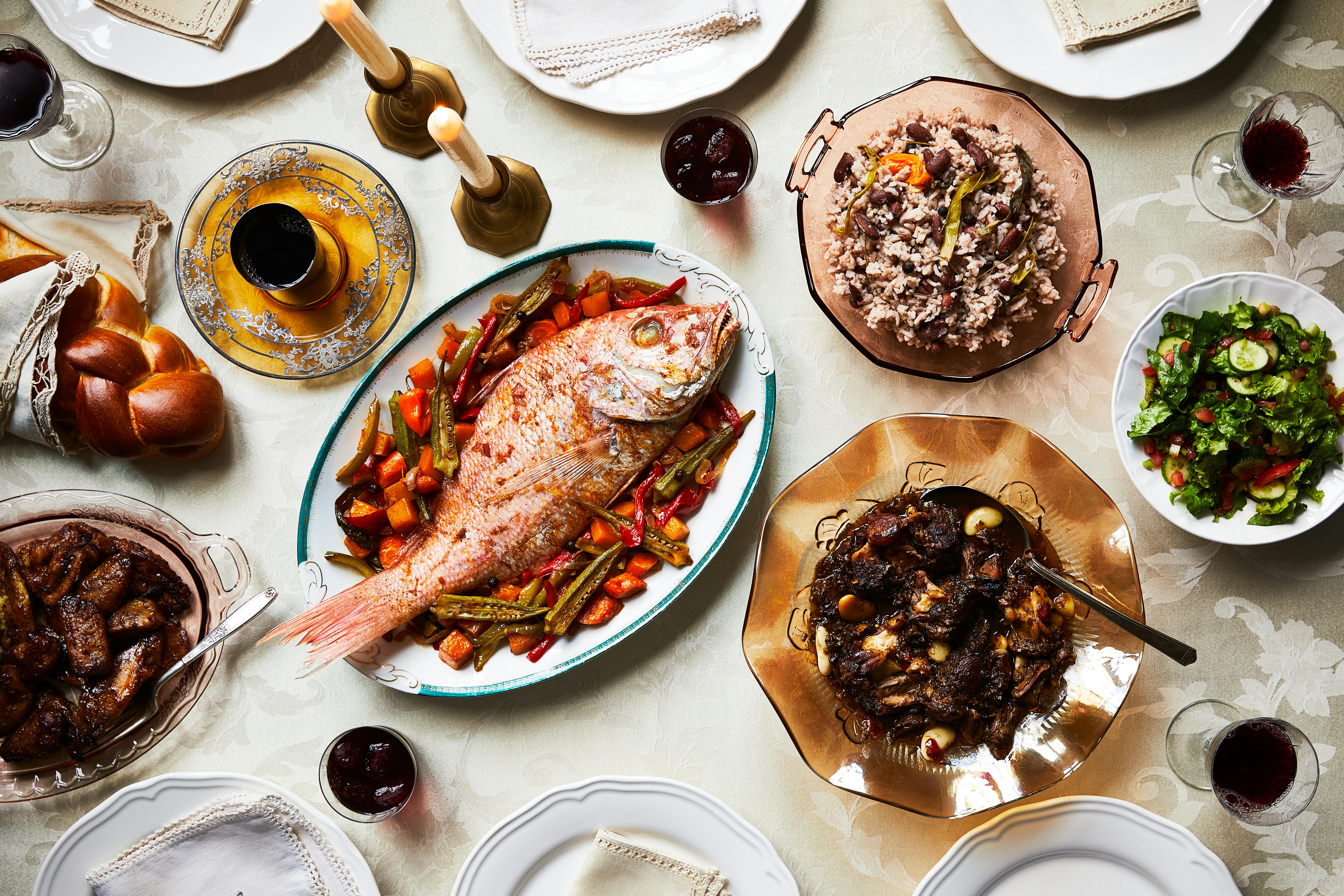Shared by Christina Whittaker


This story comes from JFS’s operation’s manager Christina Whittaker, who shares it in her own words.
I did not grow up with a Shabbat table — my mother is from Jamaica and my father was born in England. At home, we celebrated Christmas and Easter and on weekends we ate a not quite full English breakfast of eggs, tomatoes, and baked beans.
These family gatherings did not include the flavors of the Caribbean. That more exciting fare came from my maternal grandmother Gloria, or “Grandy” as I called her, whose food rituals revolved around a place I had never been: her native Jamaica.
Grandy always ate the eye of the fish first so it wouldn’t look at her as she consumed the body. This ritual of hers terrified me as a child and caused me to avoid whole fish for years. But, by the time I reached adulthood, this terror had transformed into fascination. I missed Grandy’s steamed fish, the eyes staring at me expectantly, her oxtail stew, and the rice and peas that accompanied every dinner at her table. Grandy was fashionable and dramatic; despite living in south Florida, she kept her furs from her years in New York in her closet. And her dark wooden dining room table was too long for her household of two.
On weekends when I was little, Grandy and I would venture out to the local Caribbean market to source ingredients like scotch bonnet peppers and whole allspice. My compensation for accompanying her was a gizzada — a sweet tart filled with desiccated coconut, ginger, and cinnamon.
Returning from these outings, I watched her prepare meals with the ingredients we gathered. I was fascinated by her cooking, but too intimidated to participate. Instead, I watched, sometimes standing on a chair to peer into her silver Dutch pots, which I later came to recognize as a staple of the Caribbean kitchen. The stews simmered on the stove all day; she approached dinner preparations with such care and patience. I remember the intense woodsy smell of allspice that seemed to mimic the scent of freshly sharpened pencils in her home, it was so different from the kitchen aromas at the homes of my American friends.
I didn’t consider myself part of the immigrant experience because my parents came from English speaking countries; but, still, I felt the first-generation pressure to assimilate. At school, I didn’t talk about the Jamaican food I ate at Grandy’s on the weekend and my parents packed me innocuous lunches, usually ham and cheese or peanut butter, always on white bread. I was a picky eater as a kid, so it was a small victory when I liked something. In my dad’s words “what you didn’t eat was never continued.” My parents encouraged exploration, but I think their desire to start a new life in a new place fostered this indulgence. They wanted me to feel like I belonged.
I chased that feeling to New York where I found acceptance at a small liberal arts college. In my late twenties, my relationship with my long-term partner led me to explore Judaism. He grew up in a Conservative Jewish household, but together we embarked on something new for both of us: a “home based” spiritual group centered around meditation. We made new friends, sat in weekly meditations, and it was here that I met the rabbi who would usher me through my conversion. I had grown up Catholic, but never felt fully at home in church. What I desired was community, and I found it through this shared meditation practice.
At the onset of my conversion process, I was anxious that my new identity would create distance between me and my family. But, I was pleasantly surprised that Judaism actually deepened my connection to my family. My mother’s Christmas decorations now include a menorah and she’ll ask me about the upcoming Jewish holidays and how my partner and I will be spending them.
Through my conversion, I searched for versions of my new self in food. At the table, I navigated Jewish culinary traditions including challah, schnitzel, and jachnun. None of these, however, were like the Jamaican cuisine of my childhood. But, I had a hunch that if I kept looking, I would find something. A little research revealed Jewish migration to Jamaica going as far back as the Spanish Inquisition. The island, surprisingly, was a place where all of my identities met.
Spending time with my aunt, I learned how to make steamed fish with okra, a staple on Grandy’s table. And conversations with my mother revealed that she had been working on compiling her mother’s and grandmother's recipes for years, some of which are now part of the Shabbat table I share with my partner. This process has allowed me to bring food from my childhood into my spiritual practice; there is no better time than Shabbat to engage with the rituals of my ancestors.
